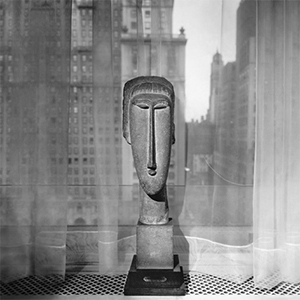Andy Stott Faith in Strangers
The first seven minutes of Faith in Strangers are as still as a December morning. […]

The first seven minutes of Faith in Strangers are as still as a December morning. Andy Stott‘s last two EPs and his second album, Luxury Problems, began, after a brief time, with the crank of a handle and the coal-hungry chug of a monstrous Victorian factory machine; this time, the Manchester producer’s third album arrives not with the clanking of sledgehammers, but with the cleansing sound of cold midnight air. On “Time Away,” a solemn euphonium horn calls out to the listener like a cargo ship returning to a remote harbor. “Who is talking, who is crouching,” asks Alison Skidmore (Stott’s former piano teacher turned vocal contributor) on the following track, “Violence,” which begins with a shrill flare of modular noise and soft, cooing synth pads. Skidmore’s lullaby, by turns erotic and menacing, stands alone and uncertain at first amid these bare elements, but it grows more assertive as the lumbering drums of “Violence” sputter into motion.
This stillness, the bleakest of quiet storms, is one of many moods that sets Faith in Strangers apart from its predecessors. However radically Stott messed around with the DNA of his earlier dub techno records at the onset of Passed Me By in 2011, that EP—and everything else since—still had in it a rudimentary dancefloor foundation. Faith in Strangers is made of the same materials as his previous records—a greyscale palette, somber atmospheres, and unsparingly harsh sounds—but the presentation is remarkably different. Where Luxury Problems lurched forward with a relentless, thumping gait, Faith in Strangers‘ locomotion is more erratic and unsteady. “Science & Industry,” for example, is one of two new wave-sounding tracks on Faith in Strangers; its metronomic beat ping-pongs lightly across the frame of the song, which creates a fresh, airy space for Skidmore’s ghoulish vocals. The album’s title track is even better. Again, it has skipping percussion—dredged from the sludge and debris of old—and a bass guitar lead that lends the song a needle-sharp groove.
“Damage” is another digression from Stott’s usual style, though it’s not quite so memorable. Sharp cymbals, overdriven kicks, and matchbox hi-hats take a tumble on a sparse grime beat that sounds like a Hyperdub record with its edges severely frayed. It’s not unwelcome, but on repeated exposure it rarely feels essential. Most of everything else on this album, however, does. That’s largely because Stott still manages to sculpt compelling new shapes from his now-familiar tools, and on Faith in Strangers, these forms are more distinctive than ever before. “No Surrender,” for example, sets crackling war-drum snares and booming 909 kicks on a rich sheen of chimes and a sample of what sounds like a vinyl record being dragged under a knackered stylus; there’s also a bossy baritone horn of the type heard when Harry Gregson-Williams is thrown in a dark room with only an orchestra and a clip of a climactic car chase for company.
Stott’s greater sense of ambition on Faith In Strangers comes with a comprehensive re-think of what he’s about musically. Apart from “How It Was,” Stott’s latest LP makes a pretty clean break from the trudging house and techno of past works and tries out a broader suite of styles that, for the most part, are a good fit for the Mancunian producer. On “Missing,” Faith in Strangers ends as it began—in morbid stillness, with Skidmore’s reverbed voice simmering softly under a plucked electric guitar, discordant satellite bleeps, and a weeping violin. It’s up there among the album’s best songs—most of which aren’t really dance tracks at all. Faith in Strangers is, with a couple of notable exceptions, bereft of the gladiatorial onslaughts of its predecessor. It remains as disquieting and spectral as anything Stott has done, but its newfound guile is such that it no longer needs to bludgeon listeners into submission to strike a killer blow.

